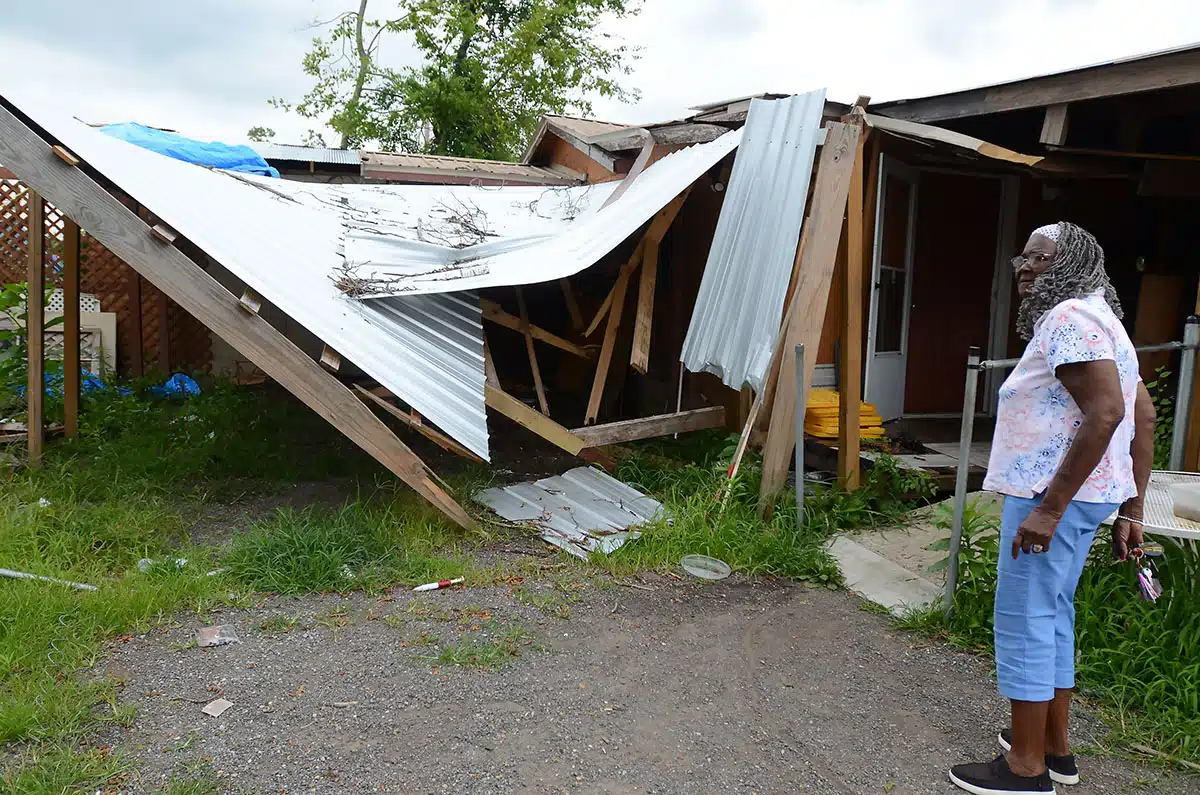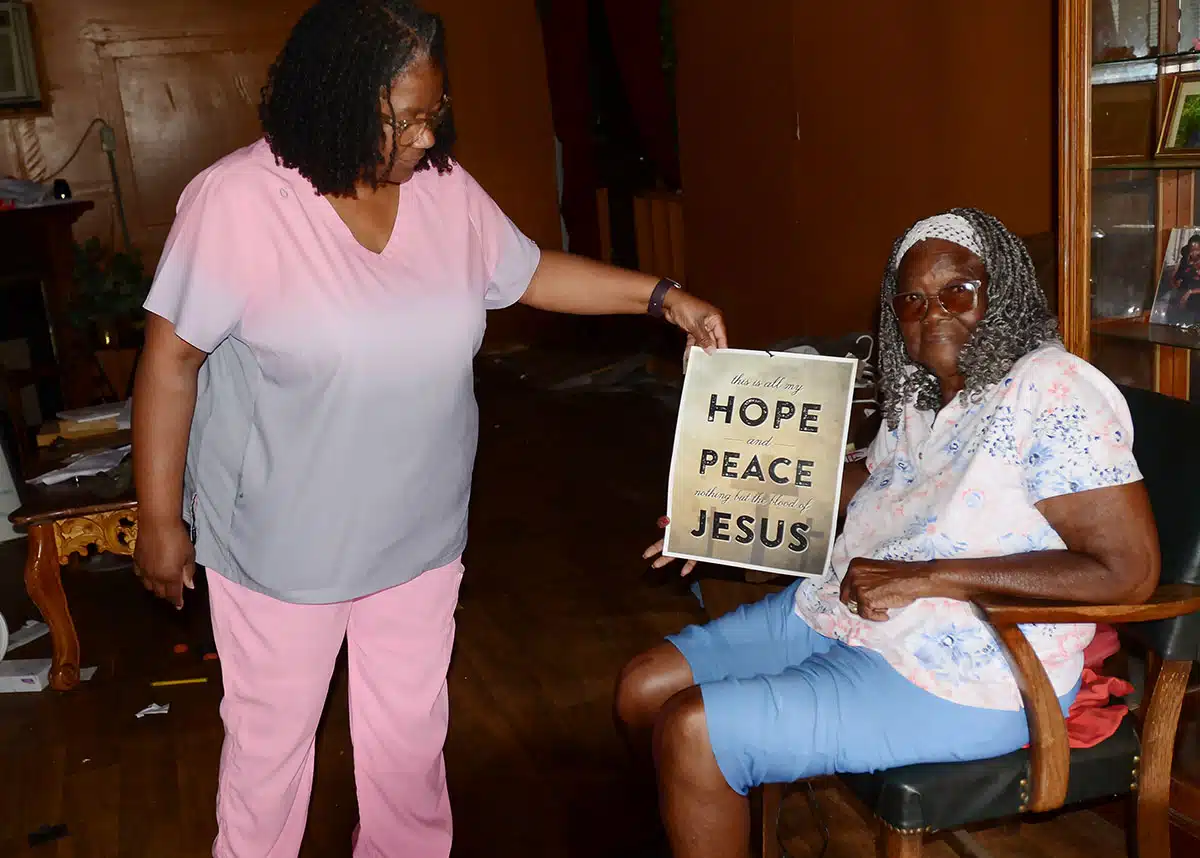Mississippi Today
For disaster victims trying to rebuild their lives, their last hope: volunteer groups

A day that began with clear, blue skies for LeeOtis Hubbard Gladney ended with destruction during nightfall, when a March 24 tornado swept through Amory.
A nightmare followed the terror of that night as Gladney soon realized her path to recovery would not be easy. After experiencing insufficient help from her insurance company, and little from the federal government, she became one of thousands who have relied on volunteer assistance to recover from a disaster.
The night of the storm, Gladney sat in her brown recliner listening to the weather forecaster track the storm. She assumed the tornado would not cause substantial damage to Amory based on past times when the tornado did not touch down.
But once the forecaster started praying for Amory, reality sunk in. Gladney’s granddaughter called, asking if Gladney could make it to her house. Then the power went out.
Gladney, who had knee surgery just a week before, struggled to move to find shelter in her home.
Soon her grandson, Rafael, rushed into the house and assisted her, along with her cane, behind a couch. He placed her on the floor and threw a mattress off a bed to cover Gladney, her husband and her younger son, Leonard.
A couple of minutes after Rafael left to protect his own family, sirens blared, high winds roared outside, and the carport’s tin roof in the backyard began to crumble. Leonard gripped Gladney’s hand for comfort as an unsettling atmosphere lingered over the family.
“After a while, it was all over,” Gladney said as her voice trailed off. “It was all over.”
Residents are still in the process of rebuilding, 95 days after a series of deadly tornadoes and strong thunderstorms swept across Mississippi – killing at least 25 people and leaving a 100-mile trail of destruction.
Gladney is one of those residents in Amory.
The morning following the storm, her daughter, Tujuana Hampton, pleaded with Gladney to leave her home, but she refused. It took Hampton two days to get Gladney out of the house, insisting she could either walk or be carried.
“When we got outside, she turned and looked at the damage to her house. She almost passed out,” Hampton stated.
Two unrooted trees rested on top of Gladney’s home, parts of the ceiling were damaged, and the foundation of her home had shifted.

She said she found herself stuck with little to no assistance from FEMA and her insurer.
“FEMA told her since she has insurance and, if the company gave her over $40,000, then there was nothing they could do to help her. But $40,000 wouldn’t even cover half of what her house and yard (repairs) would cost,” Hampton told Mississippi Today.
FEMA spokesperson Mike Wade confirmed that if a survivor receives $41,000 from insurance, any further FEMA support is considered a duplication of assistance, which is not allowed.
FEMA’s Individual Assistance Program meets basic needs and supplements disaster recovery efforts, but it cannot replace insurance or compensate for all disaster losses. Therefore, the amount of financial assistance an individual or household may receive under FEMA’s Individuals and Households Program is limited.
Michael Richmond-Crum, the director of personal lines for the American Property Casualty Insurance Association, said insurance companies have a responsibility to their customers to act urgently for covered losses following a disaster. However, many states are facing a growing affordability and availability crisis in property insurance markets.
“2022 was the eighth consecutive year in a row that the U.S. suffered at least 10 catastrophes, causing more than a billion dollars in losses each. Natural disaster losses from 2020-2022 in the U.S. exceeded $275 billion in 2022 dollars, which is the highest ever three-year total for U.S. insurers,” Richmond-Crum told Mississippi Today.
Even in federally declared disaster areas like Amory, residents like Gladney are left to rely on volunteer organizations for help in recovering.
On March 27, Samaritan’s Purse, a North Carolina-based evangelical Christian relief organization, deployed one disaster relief unit to Rolling Fork and another to Amory to assist homeowners impacted by the destruction.
Through its mobile home replacement program, 38 families from Mississippi towns and surrounding areas have been approved as of June 7. Six mobile homes were delivered to the families two months after the tornado, and others are actively in the application process.
“A lot of the families we are helping are severely underinsured or don’t have the resources to get back into their house. They are still eligible to apply for the mobile home program,” Luther Harrison, vice president of North America Ministries, told Mississippi Today.
Partnering with local churches in the community, the organization was directed to residents in the neighborhoods that needed assistance. The organization tarped damaged roofs, cut up fallen trees, and cleared debris from yards.
“We know they lost most if not everything they had, and we’re just trying to show them Christ-like love as we go out into the community and help them,” Harrison said.
In Mississippi, Samaritan’s Purse was able to help 402 families with cleanup through the assistance of 1,145 volunteers that came out to serve.
Hubbard was one of them.
“The Samaritan’s Purse came and cleaned up the yard for her. People that we don’t know came and fed us and made sure we had water,” Hampton said.
Operation BBQ Relief, a Missouri nonprofit established in May 2011, has provided over 10 million meals throughout the United States and internationally following natural disasters. They have served close to 85,000 meals in Mississippi deployments.
During the organization’s deployment to Amory on March 26 – April 3, they provided the community with 4,355 meals to the town of about 6,360 people.
Heather Williams, the director of communications for Operation BBQ Relief, said the organization tries to relieve the burden and stress residents experience when uncertain of their next meal, as a result of the closure or damage to stores and restaurants.
“We want to provide one thing that they can count on when their life has been turned upside down: a hot meal,” Williams continued. “We value them.”
Head of Volunteer Services for Operation BBQ Relief Brian Polak said the organization fuels the residents both literally, with a hot meal, and figuratively, through a sense of community.
Providing disaster relief is “one of the hardest things volunteers will ever love doing,” Polak said. There’s a willingness to help others which is what gets volunteers involved, but it’s the experiences that keep them involved, he said.
The organization has over 18,000 volunteers nationwide.
“Volunteer agencies bring varied services to those in need, instead of those in need having to seek out the assistance, which can be difficult for a multitude of reasons during those first hours, days, or weeks,” Polak stated.
In Mississippi areas, where resources are already stretched thin after natural disasters, it is often difficult to contact someone who can help. And even when assistance is provided, it can be insufficient.

Gladney has been able to move into a temporary residence of her own, after leaving Hampton’s home – 83 days after the storm.
Gladney’s home is cleared on the outside, but it remains unlivable on the inside, she said. Even though she received assistance from volunteer organizations, she refused to let them clean inside her home because of her reliance on insurance.
“I’ve been hoping and praying for Alfa to come around and do me right,” Gladney said of her insurance company.
According to Gladney, Alfa Corp. won’t condemn the home – determine the home is no longer fit for human inhabitation – because insurance would have to pay for the estimated value to rebuild her home. Instead, it is stating the conditions of the house were “pre-existent,” Gladney said.
An Alfa Corp. spokesperson stated the claims department couldn’t comment on individual claims.
“Now, she’s stuck,” Hampton said. “Her whole life was in that house. And now, that’s it.”
This article first appeared on Mississippi Today and is republished here under a Creative Commons license.
Mississippi Today
Hospitals see danger in Medicaid spending cuts
Mississippi hospitals could lose up to $1 billion over the next decade under the sweeping, multitrillion-dollar tax and policy bill President Donald Trump signed into law last week, according to leaders at the Mississippi Hospital Association.
The leaders say the cuts could force some already-struggling rural hospitals to reduce services or close their doors.
The law includes the largest reduction in federal health and social safety net programs in history. It passed 218-214, with all Democrats voting against the measure and all but five Republicans voting for it.
In the short term, these cuts will make health care less accessible to poor Mississippians by making the eligibility requirements for Medicaid insurance stiffer, likely increasing people’s medical debt.
In the long run, the cuts could lead to worsening chronic health conditions such as diabetes and obesity for which Mississippi already leads the nation, and making private insurance more expensive for many people, experts say.
“We’ve got about a billion dollars that are potentially hanging in the balance over the next 10 years,” Mississippi Hospital Association President Richard Roberson said Wednesday during a panel discussion at his organization’s headquarters.
“If folks were being honest, the entire system depends on those rural hospitals,” he said.
Mississippi’s uninsured population could increase by 160,000 people as a combined result of the new law and the expiration of Biden-era enhanced subsidies that made marketplace insurance affordable – and which Trump is not expected to renew – according to KFF, a health policy research group.
That could make things even worse for those who are left on the marketplace plans.
“Younger, healthier people are going to leave the risk pool, and that’s going to mean it’s more expensive to insure the patients that remain,” said Lucy Dagneau, senior director of state and local campaigns at the American Cancer Society.
Among the biggest changes facing Medicaid-eligible patients are stiffer eligibility requirements, including proof of work. The new law requires able-bodied adults ages 19 to 64 to work, do community service or attend an educational program at least 80 hours a month to qualify for, or keep, Medicaid coverage and federal food aid.
Opponents say qualified recipients could be stripped of benefits if they lose a job or fail to complete paperwork attesting to their time commitment.
Georgia became the case study for work requirements with a program called Pathways to Coverage, which was touted as a conservative alternative to Medicaid expansion.
Ironically, the 54-year-old mechanic chosen by Georgia Gov. Brian Kemp to be the face of the program got so fed up with the work requirements he went from praising the program on television to saying “I’m done with it” after his benefits were allegedly cancelled twice due to red tape.
Roberson sent several letters to Mississippi’s congressional members in weeks leading up to the final vote on the sweeping federal legislation, sounding the alarm on what it would mean for hospitals and patients.
Among Roberson’s chief concerns is a change in the mechanism called state directed payments, which allows states to beef up Medicaid reimbursement rates – typically the lowest among insurance payors. The new law will reduce those enhanced rates to nearly as low as the Medicare rate, costing the state at least $500 million and putting rural hospitals in a bind, Roberson told Mississippi Today.
That change will happen over 10 years starting in 2028. That, in conjunction with the new law’s one-time payment program called the Rural Health Care Fund, means if the next few years look normal, it doesn’t mean Mississippi is safe, stakeholders warn.
“We’re going to have a sort of deceiving situation in Mississippi where we look a little flush with cash with the rural fund and the state directed payments in 2027 and 2028, and then all of a sudden our state directed payments start going down and that fund ends and then we’re going to start dipping,” said Leah Rupp Smith, vice president for policy and advocacy at the Mississippi Hospital Association.

Even with that buffer time, immediate changes are on the horizon for health care in Mississippi because of fear and uncertainty around ever-changing rules.
“Hospitals can’t budget when we have these one-off programs that start and stop and the rules change – and there’s a cost to administering a program like this,” Smith said.
Since hospitals are major employers – and they also provide a sense of safety for incoming businesses – their closure, especially in rural areas, affects not just patients but local economies and communities.
U.S. Rep. Bennie Thompson is the only Democrat in Mississippi’s congressional delegation. He voted against the bill, while the state’s two Republican senators and three Republican House members voted for it. Thompson said in a statement that the new law does not bode well for the Delta, one of the poorest regions in the U.S.
“For my district, this means closed hospitals, nursing homes, families struggling to afford groceries, and educational opportunities deferred,” Thompson said. “Republicans’ priorities are very simple: tax cuts for (the) wealthy and nothing for the people who make this country work.”
While still colloquially referred to as the One Big Beautiful Bill Act, the name was changed by Democrats invoking a maneuver that has been used by lawmakers in both chambers to oppose a bill on principle.
“Democrats are forcing Republicans to delete their farcical bill name,” Senate Democratic Leader Charles Schumer of New York said in a statement. “Nothing about this bill is beautiful — it’s a betrayal to American families and it’s undeserving of such a stupid name.”
The law is expected to add at least $3.3 trillion to the nation’s debt over the next 10 years, according to the most recent estimate from the Congressional Budget Office.
This article first appeared on Mississippi Today and is republished here under a Creative Commons Attribution-NoDerivatives 4.0 International License.
The post Hospitals see danger in Medicaid spending cuts appeared first on mississippitoday.org
Note: The following A.I. based commentary is not part of the original article, reproduced above, but is offered in the hopes that it will promote greater media literacy and critical thinking, by making any potential bias more visible to the reader –Staff Editor.
Political Bias Rating: Center-Left
This article reports on the negative impacts of a major federal tax and policy bill on Medicaid funding and rural hospitals in Mississippi. While it presents factual details and statements from stakeholders, the tone and framing emphasize the harmful consequences for vulnerable populations and health care access, aligning with concerns typically raised by center-left perspectives. The article highlights opposition by Democrats and critiques the bill’s priorities, particularly its effect on poor and rural communities, suggesting sympathy toward social safety net preservation. However, it maintains mostly factual reporting without overt partisan language, resulting in a moderate center-left bias.
Crooked Letter Sports Podcast
Podcast: The Mississippi Sports Hall of Fame Class of ’25
The MSHOF will induct eight new members on Aug 2. Rick Cleveland has covered them all and he and son Tyler talk about what makes them all special.
Stream all episodes here.
This article first appeared on Mississippi Today and is republished here under a Creative Commons Attribution-NoDerivatives 4.0 International License.
The post Podcast: The Mississippi Sports Hall of Fame Class of '25 appeared first on mississippitoday.org
Mississippi Today
‘You’re not going to be able to do that anymore’: Jackson police chief visits food kitchen to discuss new public sleeping, panhandling laws
Diners turned watchful eyes to the stage as Jackson Police Chief Joseph Wade took to the podium. He visited Stewpot Community Services during its daily free lunch hour Thursday to discuss new state laws, which took effect two days earlier, targeting Mississippians experiencing homelessness.
“I understand that you are going through some hard times right now. That’s why I’m here,” Wade said to the crowd. “I felt it was important to come out here and speak with you directly.”
Wade laid out the three bills that passed earlier this year: House Bill 1197, the “Safe Solicitation Act,” HB 1200, the “Real Property Owners Protection Act” and HB 1203, a bill that prohibits camping on public property.
“Sleeping and laying in public places, you’re not going to be able to do that anymore,” he said. “There’s a law that has been passed that you can’t just set up encampments on public or private properties where it’s a public nuisance, it’s a problem.”
The “Real Property Owners Protection Act,” authored by Rep. Brent Powell, R-Brandon, is a bill that expedites the process of removing squatters. The “Safe Solicitation Act,” authored by Rep. Shanda Yates, I-Jackson, requires a permit for panhandling and allows people to be charged with a misdemeanor if they violate this law. The offense is punishable by a fine not to exceed $300 and an offender could face up to six months in jail. Wade said he’s currently working with his legal department to determine the best strategy for creating and issuing permits.
“We’re going to navigate these legal challenges, get some interpretations, not only from our legal department, but the Attorney General’s office to ensure that we are doing it legally and lawfully, because I understand that these are citizens,” he said. “I understand that they deserve to be treated with respect, and I understand that we are going to do this without violating their constitutional rights.”
Wade said the Jackson Police Department is steadily fielding reports of squatters in abandoned properties and the law change gives officers new power to remove them more quickly. The added challenge? Figuring out what to do with a person’s belongings.
“These people are carrying around what they own, but we are not a repository for all of their stuff,” he said. “So, when we make that arrest, we’ve got to have a strategic plan as to what we do with their stuff.”
Wade said there needs to be a deeper conversation around the issues that lead someone to becoming homeless.
“A lot of people that we’re running across that are homeless are also suffering from medical conditions, mental health issues, and they’re also suffering from drug addiction and substance abuse. We’ve got to have a strategic approach, but we also can’t log jam our jail down in Raymond,” Wade said.
He estimates that more than 800 people are currently incarcerated at the Raymond Detention Center, and any increase could strain the system as the laws continue to be enforced.
“I think there’s layers that we have to work through, there’s hurdles that we are going to overcome, but we’ve got to make sure that we do it and make sure that my team and JPD is consistent in how we enforce these laws,” Wade said.
Diners applauded Wade after he spoke, in between bites of fried chicken, salad, corn and 4th of July-themed packaged cakes. Wade offered to answer questions, but no one asked any.
Rev. Jill Buckley, executive director of Stewpot, said that the legislation is a good tool to address issues around homelessness and community needs. She doesn’t want to see people who are homeless be criminalized, but she also wants communities to be safe.
“I support people’s right to self determine, and we can’t impose our choices on other people, but there are some cases in which that impinges on community safety, and so to the extent that anyone who is camping or panhandling or squatting and is a danger to themselves and others, of course, I fully support that kind of law. I don’t support homelessness being criminalized as such,” Buckley said.

Many of the people Wade addressed while they ate Thursday said they have housing, don’t panhandle, and shouldn’t be directly impacted by the legislation. But Marcus Willis, 42, said it would make more sense if elected officials wanted to combat the negative impacts of homelessness that they help more people secure employment.
“There ain’t enough jobs,” said Willis, who was having lunch with his girlfriend Amber Ivy.
The two live in an apartment together nearby on Capitol Street, where Ivy landed after her mother, whom Ivy had been living with, suffered a stroke and lost the property. Similarly, Willis started coming to eat at Stewpot after his grandmother, whose house he used to visit for lunch, passed away.
Willis holds odd jobs – cutting grass, home and auto repair – so the income is inconsistent, and every opportunity for stable employment he said he’s found is outside of Jackson in the suburbs. The couple doesn’t have a car.
Making rent every month usually depends on their ability to find someone to help chip in, said Ivy, who is in recovery from substance abuse. She said she’s watched problems surrounding homelessness grow over the years in Jackson. Ivy grew up near Stewpot and has lived in various neighborhoods across the city – except for the times she moved out of state when things got too rough.
“There was just moments where I just had to leave,” Ivy said. “Sometimes if you hit a slump here, there’s almost no way for you to get out of it.”
This article first appeared on Mississippi Today and is republished here under a Creative Commons Attribution-NoDerivatives 4.0 International License.
The post 'You're not going to be able to do that anymore': Jackson police chief visits food kitchen to discuss new public sleeping, panhandling laws appeared first on mississippitoday.org
Note: The following A.I. based commentary is not part of the original article, reproduced above, but is offered in the hopes that it will promote greater media literacy and critical thinking, by making any potential bias more visible to the reader –Staff Editor.
Political Bias Rating: Center-Right
This article primarily reports on new laws in Jackson, Mississippi, targeting public sleeping, panhandling, and squatting, focusing on statements by Police Chief Joseph Wade and community perspectives. The coverage presents the legislative measures—authored by Republican and independent lawmakers—with a tone that emphasizes law enforcement challenges and community safety, reflecting a conservative approach to homelessness as a public order issue. While it includes voices concerned about criminalization and the need for social support, the overall framing centers on law enforcement and property protection. The article maintains factual reporting without overt editorializing but leans slightly toward a center-right perspective by highlighting legal enforcement as a solution.
-
News from the South - Arkansas News Feed6 days ago
Real-life Uncle Sam's descendants live in Arkansas
-
News from the South - Georgia News Feed5 days ago
'Big Beautiful Bill' already felt at Georgia state parks | FOX 5 News
-
News from the South - Oklahoma News Feed6 days ago
LOFT report uncovers what led to multi-million dollar budget shortfall
-
News from the South - Alabama News Feed7 days ago
Alabama schools to lose $68 million in federal grants under Trump freeze
-
News from the South - Missouri News Feed7 days ago
Celebrate St. Louis returns with new Superman-themed drone show
-
News from the South - South Carolina News Feed7 days ago
South Carolina lawmakers react as House approves Trump’s sweeping economic package
-
News from the South - North Carolina News Feed5 days ago
Raleigh caps Independence Day with fireworks show outside Lenovo Center
-
News from the South - Tennessee News Feed6 days ago
Officers run for cover after man in car fired shots at them in Downtown Memphis




















































